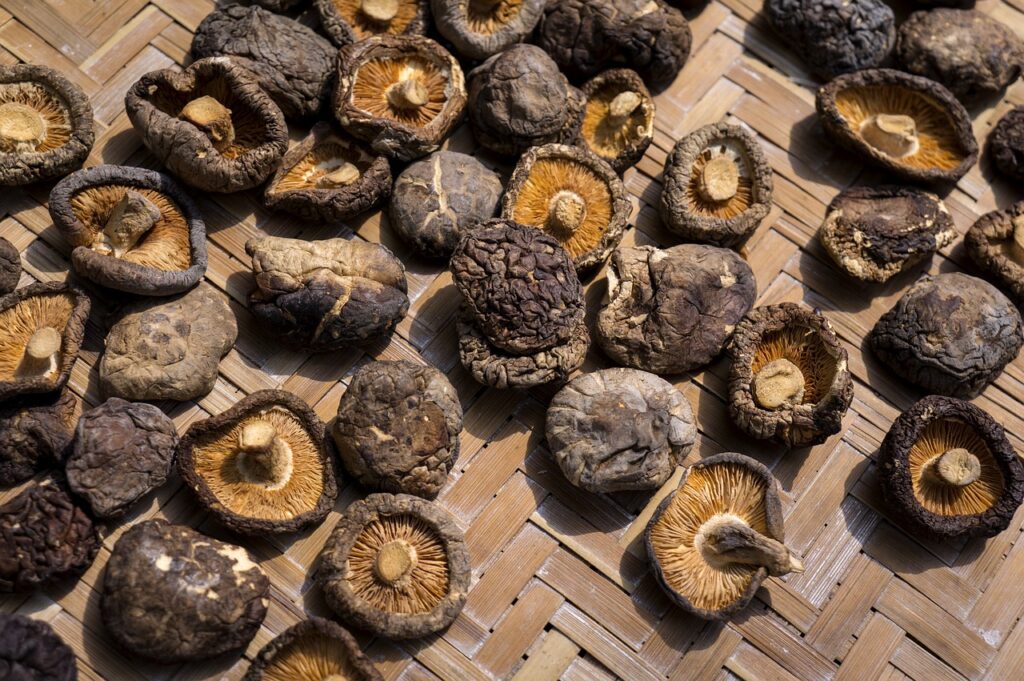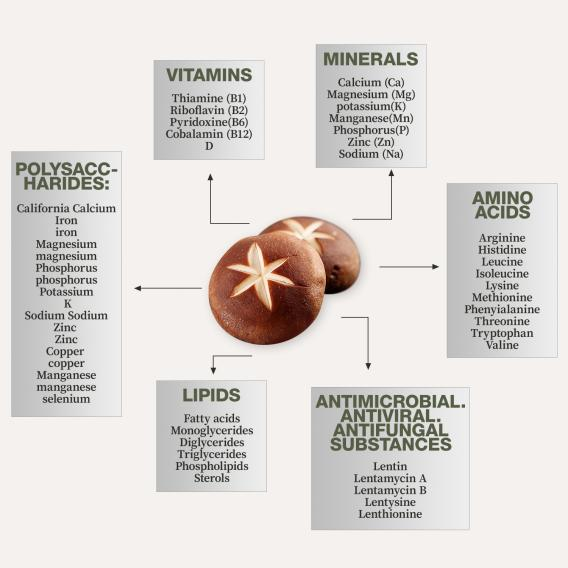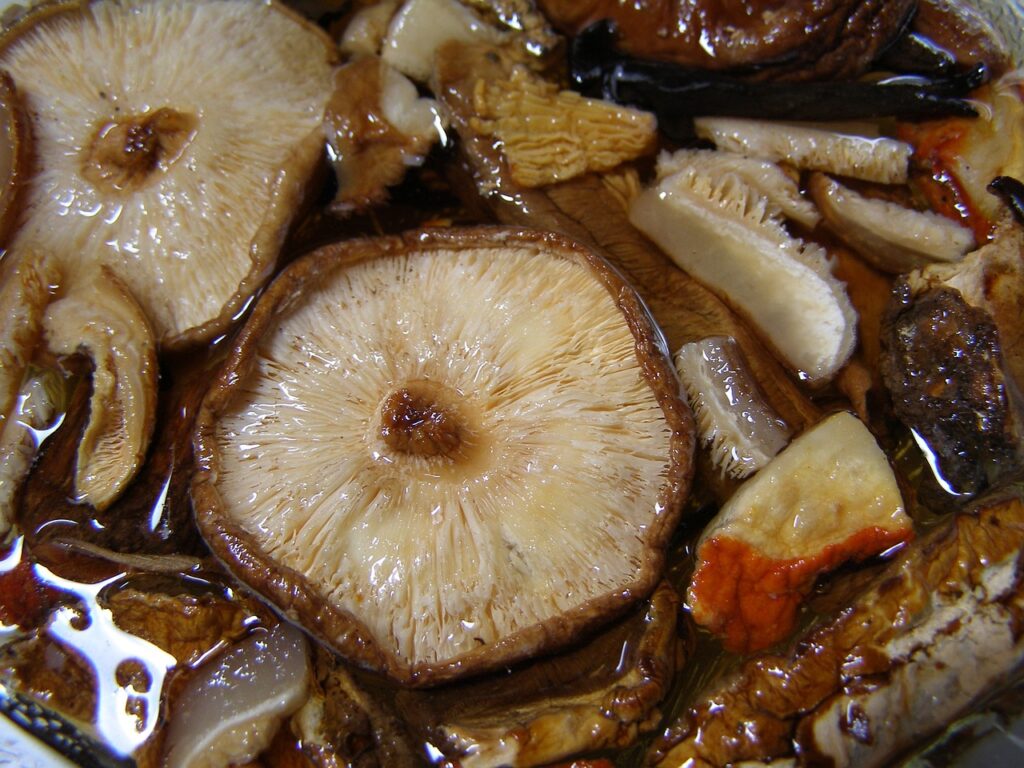Shiitake Mushrooms: A Nutritious Superfood and Its Health Benefits

What Are Shiitake Mushrooms?
Shiitake mushrooms, scientifically known as Lentinula edodes (L. edodes), are also referred to as shiitake. They naturally grow in the moist, warm regions of North America, South America, Asia, and Australia, and are widely cultivated around the world [2]. Characterized by large caps that range from tan to dark brown, shiitake mushrooms typically grow in clusters on the decaying wood of deciduous trees. They especially thrive on the remnants of oak, chestnut, beech, maple, poplar, alder, hornbeam, ironwood, and mulberry trees in warm climates.
Shiitake mushrooms are among the most widely grown and consumed mushrooms globally, accounting for approximately 25% of the annual total mushroom production worldwide [1].
Nutritional Profile of Shiitake Mushrooms
Shiitake mushrooms are an ideal health food, low in fat and rich in polyunsaturated fatty acids. They are packed with carbohydrates, proteins, and essential amino acids. Shiitake proteins contain 18 different amino acids, including all essential amino acids, making their composition highly compatible with human nutritional needs. Additionally, shiitake mushrooms are a good source of various vitamins and minerals such as copper, zinc, selenium, iron, and vitamins B, C, and D, which are crucial for maintaining overall health.
Shiitake mushrooms also contain numerous bioactive compounds, including polysaccharides, antioxidants, dietary fiber, and ergosterol. These components play significant roles in promoting health and preventing diseases. Among the most important bioactive components are polysaccharides, particularly α- and β-glucans. These polysaccharides exhibit various benefits such as immunomodulatory, anticancer, antioxidant, and antibacterial effects, which can enhance the immune system and help prevent and treat various diseases.
Regular consumption of shiitake mushrooms not only provides rich nutrition but also offers multiple health benefits, making them an ideal choice for those pursuing a healthy lifestyle.
Below are the key nutritional components of shiitake mushrooms:

[3]
Benefits of Shiitake Mushrooms
Enhances Your Immune System
Numerous studies have focused on elucidating the immunomodulatory properties of polysaccharides extracted from the mycelium or fruiting bodies of shiitake mushrooms in animal models. Shiitake polysaccharides can directly affect monocytes/macrophages and innate lymphoid cells (ILCs), thereby regulating the initiation of early innate immune responses. By modulating the production of cytokines and chemokines, shiitake polysaccharides enhance the protective function of the immune system. Additionally, shiitake polysaccharides also enhance adaptive immune responses by influencing the functions of T cells and B cells, promoting lymphocyte proliferation, increasing B cell activation, and facilitating the secretion of immunoglobulins and cytokines.
Research indicates that β-glucans can upregulate the proliferation of splenic lymphocytes in mice infected with Salmonella typhimurium, increase serum IFN-α levels, and promote the production of Th1 cytokines [4].
A randomized controlled study further validated the positive effects of shiitake polysaccharides on immune cells. In this study, 52 participants were randomly divided into two groups, one consuming 5 grams of dried shiitake daily and the other consuming 10 grams daily for 4 weeks. The results showed that consuming shiitake significantly promoted the in vitro proliferation of γδ-T cells and NK-T cells, helping these immune cells better recognize and attack pathogens [5].
These studies demonstrate the significant potential of shiitake polysaccharides in enhancing immune system functions, showing multiple benefits in maintaining and improving health through both innate and adaptive immune responses.
Contains Anti-Inflammatory Properties
β-glucans have the ability to reduce the secretion of pro-inflammatory cytokines by macrophages. To verify the anti-inflammatory effects of shiitake crude polysaccharides (LeA), researchers conducted experiments on mice with colitis, administering 500 μg/mouse of LeA daily. The results showed that LeA significantly prevented dextran sulfate sodium (DSS)-induced colitis in mice. This study revealed that polysaccharides derived from shiitake mushrooms could effectively inhibit the expression of inflammatory cytokines in the colon of mice [6].
Furthermore, studies have found that vitamin D-rich shiitake extracts exhibit significant anti-inflammatory properties in mouse models. The results indicated that shiitake extracts supplemented with vitamin D significantly reduced liver damage in mice with inflammatory liver disease [7].
These findings suggest that shiitake polysaccharides and their vitamin D-rich extracts have remarkable anti-inflammatory effects in various inflammatory diseases, providing important scientific evidence for future therapeutic applications.
Potential Anti-Cancer Properties
The anti-tumor activity of glucans is often attributed to the reduced tumor resistance resulting from immune system stimulation [8].
Previous studies have reported the anti-proliferative and apoptosis-inducing effects of L. edodes extracts on breast cancer cells [9]. These extracts do not affect the growth of normal breast cells. Additionally, they show significant anti-proliferative and pro-apoptotic activities against colorectal tumor cell lines [10]. Clinical trials on gastric cancer patients have shown that shiitake mushrooms are an effective resource for alleviating the severe side effects of chemotherapy [11]. Research has discovered that LP1, a specific protein extracted from shiitake mushrooms, has significant anti-cancer potential against human gastric cancer cells in vitro. LP1 can induce autophagic apoptosis in gastric cancer cells and reduce their metastatic capabilities [12].
These findings highlight the important potential applications of shiitake mushrooms and their extracts in various cancer treatments, not only directly inhibiting the growth and spread of cancer cells but also enhancing the immune system to improve treatment outcomes.
Supports Cardiovascular Health
A specific enzyme found in shiitake mushrooms, called eritadenine, can prevent blood vessel constriction, thereby helping to lower blood pressure. This is particularly important for individuals at high risk of cardiovascular complications such as heart attacks, strokes, and atherosclerosis. Eritadenine relaxes the blood vessel walls, improving blood circulation, and effectively reducing the risk of hypertension, providing crucial support for cardiovascular health [18].
Three compounds found in shiitake mushrooms have been shown to effectively lower cholesterol levels. These compounds include eritadenine, sterols, and β-glucans. Eritadenine works by inhibiting cholesterol synthesis, while sterols help block the absorption of cholesterol in the intestines. β-glucans increase the concentration of cholesterol and bile acids in the intestinal lumen, reducing their absorption by intestinal epithelial cells. Additionally, they may reduce plasma cholesterol levels by increasing intestinal viscosity or scavenging small molecules within their complex structure [13].
A study on rats fed a high-fat diet revealed that compared to the control group not consuming any mushrooms, those consuming shiitake mushrooms exhibited lower liver fat content, reduced plaque formation on arterial walls, and significantly lower cholesterol levels. Although these preliminary findings are promising, more human trials are needed to further validate their effects before they can be broadly applied to human health.
Combats Obesity
Globally, the prevalence of obesity continues to rise, posing a devastating blow to sustainable health. Obesity is not only associated with insulin resistance, type 2 diabetes, cardiovascular issues, and fatty liver disease, but it also increases the risk of developing Alzheimer’s disease (AD) and other neurodegenerative conditions. Therefore, researching methods to reduce dietary fat content to achieve weight loss becomes critically important [14].
Studies indicate that β-glucans help enhance satiety, reduce food intake, slow nutrient absorption, and lower plasma lipid (fat) levels. A study on rats found that those on a high-dose shiitake diet (with mushroom powder added to a high-fat diet) gained 35% less weight compared to those on a low or medium shiitake diet. Consistent with weight changes, the liver mass, subcutaneous fat, epididymal fat, and brown fat mass of mice on a high-fat diet supplemented with shiitake β-glucans were significantly reduced. Furthermore, the total fat mass in these rats was notably decreased, indicating a downward trend in fat accumulation.
These findings suggest that shiitake mushrooms and their β-glucans have significant positive effects on weight management and metabolic health, providing new strategies for preventing and controlling obesity and related metabolic diseases. Two studies reported that supplementing L. edodes-derived β-glucans for 28 consecutive days improved gut microbiota dysbiosis in aged mice, thereby improving insulin resistance in type 2 diabetic rats lacking insulin [15]. Long-term use of L. edodes β-glucans can also prevent high-fat diet-induced gut microbiota dysbiosis. Gut microbiota dysbiosis and obesity are closely related to cognitive decline [16]. L. edodes β-glucans can prevent high-fat diet-induced cognitive decline.

Side Effects and Precautions
在极少数情况下,食用生的或略微煮熟的香菇会引发称为 “香菇皮炎” 的过敏反应。症状通常在食用后约 24 小时内出现,阳光照射可能会加剧。幸运的是,这些症状通常会在 3 到 21 天内自行消退。
Shiitake dermatitis is believed to be related to the polysaccharide components in shiitake mushrooms. While this condition is rare, understanding its symptoms and how to manage them is important for ensuring the safe consumption of shiitake mushrooms [17].
[1]Vane CH. (2003). “Monitoring decay of black gum wood (Nyssa sylvatica) during growth of the Shiitake mushroom (Lentinula edodes) using diffuse reflectance infrared spectroscopy”. Applied Spectroscopy. 57 (5): 514–517.
[2]Muszyńska B., Pazdur P., Lazur J., Sułkowska-Ziaja K. Lentinula edodes (Shiitake)—Biological activity. Med. Int. Rev. 2017;27:189–195.
[3]Roszczyk A, Turło J, Zagożdżon R, Kaleta B. Immunomodulatory Properties of Polysaccharides from Lentinula edodes. Int J Mol Sci. 2022 Aug 11;23(16):8980. doi: 10.3390/ijms23168980. PMID: 36012249; PMCID: PMC9409024.
[4]Kim S.P., Park S.O., Lee S.J., Nam S.H., Friedman M. A Polysaccharide isolated from the liquid culture of Lentinus edodes (Shiitake) mushroom mycelia containing black rice bran protects mice against salmonellosis through upregulation of the Th1 immune reaction. J. Agric. Food Chem. 2014;62:2384–2391. doi: 10.1021/jf405223q.
[5]Dai X., Stanilka J.M., Rowe C.A., Esteves E.A., Nievesm C., Jr., Spaiserm S.J., Christman M.C., Langkamp-Henken B., Percival S.S. Consuming Lentinula edodes (Shiitake) Mushrooms Daily Improves Human Immunity: A Randomized Dietary Intervention in Healthy Young Adults. J. Am. Coll. Nutr. 2015;34:478–487. doi: 10.1080/07315724.2014.950391.
[6]ALAGBAOSO CA, MIZUNO M. LENTINULA EDODES POLYSACCHARIDES SUPPRESSED PRO-INFLAMMATORY CYTOKINES EXPRESSION AND COLITIS IN MICE. Arq Gastroenterol [Internet]. 2022Apr;59(2):288–95. Available from: https://doi.org/10.1590/S0004-2803.202202000-51
[7]Muszyńska B, Kała K, Włodarczyk A, Krakowska A, Ostachowicz B, Gdula-Argasińska J, Suchocki P. Lentinula edodes as a Source of Bioelements Released into Artificial Digestive Juices and Potential Anti-inflammatory Material. Biol Trace Elem Res. 2020 Apr;194(2):603-613. doi: 10.1007/s12011-019-01782-8. Epub 2019 Jun 29. Erratum in: Biol Trace Elem Res. 2020 Apr;194(2):614-615. doi: 10.1007/s12011-019-01823-2. PMID: 31256391; PMCID: PMC7015957.
[8]M. Zhang, S.W.W. Cui, P.C.K. Cheung, Q. Wang Antitumor polysaccharides from mushrooms: A review on their isolation process, structural characteristics and antitumor activity.
[9]Israilides C., Kletsas D., Arapoglou D., Philippoussis A., Pratsinis H., Ebringerová A., Hříbalová V., Harding S.E. In vitro cytostatic and immunomodulatory properties of the medicinal mushroom Lentinula edodes. Phytomedicine. 2008;15:512–519. doi: 10.1016/j.phymed.2007.11.029.
[10]Jakopovic B., Oršolić N., Pavelić S.K. Antitumor, immunomodulatory and antiangiogenic efficacy of medicinal mushroom extract mixtures in advanced colorectal cancer animal model. Molecules. 2020;25:5005. doi: 10.3390/molecules25215005.
[11]Okuno K., Uno K. Efficacy of orally administered Lentinula edodes mycelia extract for advanced gastrointestinal cancer patients undergoing cancer chemotherapy: A pilot study. Asian Pac. J. Cancer Prev. 2011;12:1671–1674.
[12]Batool S, Joseph TP, Hussain M, Vuai MS, Khinsar KH, Din SRU, Padhiar AA, Zhong M, Ning A, Zhang W, Cao J, Huang M. LP1 from Lentinula edodes C91-3 Induces Autophagy, Apoptosis and Reduces Metastasis in Human Gastric Cancer Cell Line SGC-7901. Int J Mol Sci. 2018 Sep 30;19(10):2986. doi: 10.3390/ijms19102986. PMID: 30274346; PMCID: PMC6213425.
[13]P. Sima, L. Vannucci, V. Vetvicka β-Glucans and cholesterol International Journal of Molecular Medicine, 41 (4) (2018), pp. 1799-1808.
[14]Fruh SM. Obesity: risk factors, complications, and strategies for sustainable long-term weight management. J Am Assoc Nurse Pract. 2017;29:S3–s14. doi: 10.1002/2327-6924.12510.
[15]Yang HJ, Kim MJ, Kwon DY, Kim DS, Zhang T, Ha C, Park S. Combination of aronia, red ginseng, shiitake mushroom and nattokinase potentiated insulin secretion and reduced insulin resistance with improving gut microbiome dysbiosis in insulin deficient type 2 diabetic rats. Nutrients. 2018;10:54. doi: 10.3390/nu10010054.
[16]Shi H, Wang Q, Zheng M, Hao S, Lum JS, Chen X, Huang XF, Yu Y, Zheng K. Supplement of microbiota-accessible carbohydrates prevents neuroinflammation and cognitive decline by improving the gut microbiota-brain axis in diet-induced obese mice. J Neuroinflamm. 2020;17:77. doi: 10.1186/s12974-020-01760-1.
[17]Boels D; Landreau A; Bruneau C; Garnier R; Pulce C; Labadie M; de Haro L; Harry P. (2014). “Shiitake dermatitis recorded by French Poison Control Centers – New case series with clinical observations”. Clinical Toxicology. 52 (6): 625–8.
[18]Josefine Enman, Ulrika Rova, and Kris A. Berglund Journal of Agricultural and Food Chemistry 2007 55 (4), 1177-1180 DOI: 10.1021/jf062559+
